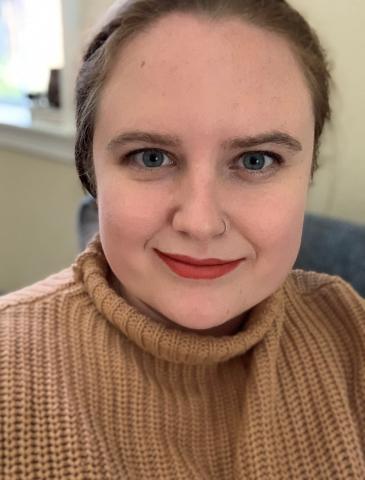
Student Profile: Kayleigh Watters
Pursues Trauma-Informed Care Career

Kayleigh Watters is a student in PAU’s PhD in Clinical Psychology program and a past president of the PAU Association of Traumatic-Stress Studies. Her research and work experiences have taken her from San Quentin State Prison to the San Francisco Veterans Administration, where she currently works with women who have experienced sexual trauma.
“I really want to work with PTSD and trauma. I want to work with people who are stigmatized and not viewed as people who need services. That’s very much the case with sexual assault survivors, even in 2021.”
The Department of Defense reports that approximately 0.6% of active-duty service members were involved in a sexual assault in the 2020 fiscal year. Outside of military reporting systems, 20% of women and 2% of men in the general population report a sexual assault in their lifetime. Both statistics are likely to be underreported due to several factors.
“Reporting is difficult in the military. A survivor may need to report the assault to their commanding officer. It may sideline the survivor’s career while they’re told to not ruin the perpetrator’s career. Even after their service, a lot of women don’t feel comfortable going into certain offices at the VA because they feel the military has failed them, so why would the VA be any different?”
Watters works with survivors who have a wide range of experiences, including military sexual trauma, combat trauma, or interpersonal violence. Military sexual trauma is a term that covers sexual harassment, sexual touching, and sexual assault, such as rape.
“We’re born with the expectation that the world is going to be a safe place for me, or I’m capable of doing things,” Watters said. “And then you’re assaulted or experience some sort of horrendous trauma and it can change the way in which you perceive the world, and the way in which you perceive yourself and others. So instead of thinking ‘I’m capable,’ it becomes ‘I failed this test because something’s wrong with me.’”
In San Quentin State Prison, Watters met men serving life sentences whose earliest life experiences may have involved trauma.
“In a lot of the cases, they were raised in a household that did not protect them, that neglected them or abused them. So, they turned to the only resources they knew, which was often being affiliated with a gang,” she said.
Listening to their stories made Watters realize prisons do not offer trauma-informed care in the way they could or should.
“We need psychologists in these places of power, where they’re making decisions. For example, we have solitary confinement in the prison system, which we know is terrible and does not ‘teach a lesson’ and which is psychologically detrimental. There needs to be a psychologist in the system to actually do something,” she said.
Watters is drawn to these intense environments. She hopes to continue working with, and researching, military sexual trauma. She would like to be involved in policy rather than private practice.
“I love the work I do and I am excited to not only help individual survivors of sexual assault but also create lasting change for survivors of sexual assault.”